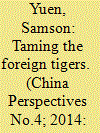|
|
|
Sort Order |
|
|
|
Items / Page
|
|
|
|
|
|
|
| Srl | Item |
| 1 |
ID:
086323


|
|
|
|
|
| Publication |
2009.
|
| Summary/Abstract |
After more than a decade of preparation, China finally passed the Anti-Monopoly Law (AML) on 30 August 2007. This paper examines the debate over whether or not administrative monopoly should be included in the ambit of the AML, which took place throughout the drafting process of this new law. Administrative monopoly refers to the abusive use of administrative power by government agencies to engage in monopolistic activities. Owing to the administrative nature of this type of monopoly, the intent to regulate it by an economic law, such as the AML, has stirred up much controversy. Having analyzed the arguments both in support of and in opposition to the inclusion, this paper suggests the need to adopt a more comprehensive scheme in tackling administrative monopoly. Also, the enforcement mechanism of the AML will have to be strengthened in order to prevent this new law from degenerating into 'a toothless tiger'. Furthermore, the competition law regime of China will benefit from in-depth research in overseas anti-monopoly practices. In particular, the experiences of the former socialist states in Europe should be taken into account, given that they are similarly undergoing the transition from a planned economy to a market economy.
|
|
|
|
|
|
|
|
|
|
|
|
|
|
|
|
| 2 |
ID:
136294


|
|
|
|
|
| Summary/Abstract |
Thirty years after the launch of the “reform and opening up” policy, China finally implemented its first anti-trust law in 2008, a move lauded by an international law firm as a “tremendous leap forward” that brought the country “squarely into the modern world of antitrust and competition law.”(1)Yet, given the law’s novelty on Chinese soil, few would have expected China to suddenly begin aggressively enforcing it. Since 2013, Chinese anti-trust regulators have become active in deploying the anti-trust law to initiate probes and impose hefty fines on industry associations, foreign carmakers, eyewear makers, and baby formula manufacturers, meanwhile justifying “dawn raids” on selected firms. Many of their high-profile targets are multinational firms that until then enjoyed a comfortable presence in China. Facing tightened enforcement, foreign companies and chambers of commerce are complaining that regulators are using the law selectively against foreign firms and that investigations lack transparency and respect for the rule of law.Chinese regulators, on the other hand, argue that they are impartial towards domestic and foreign companies, and that they are merely enforcing the anti-trust law in order to create a level playing field for both domestic and foreign companies, benefit Chinese consumers, and bring China closer to the rule of law.
|
|
|
|
|
|
|
|
|
|
|
|
|
|
|
|
|
|
|
|
|